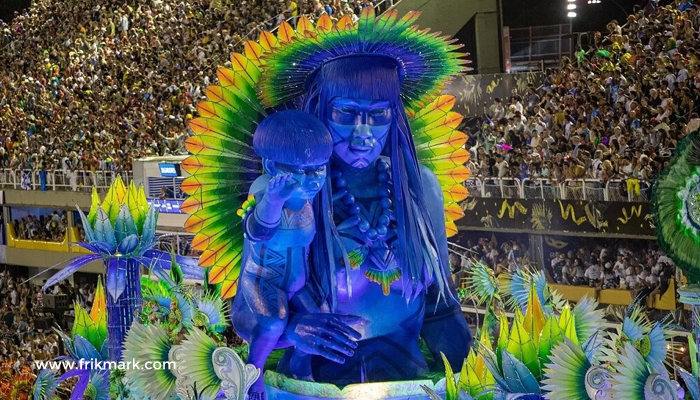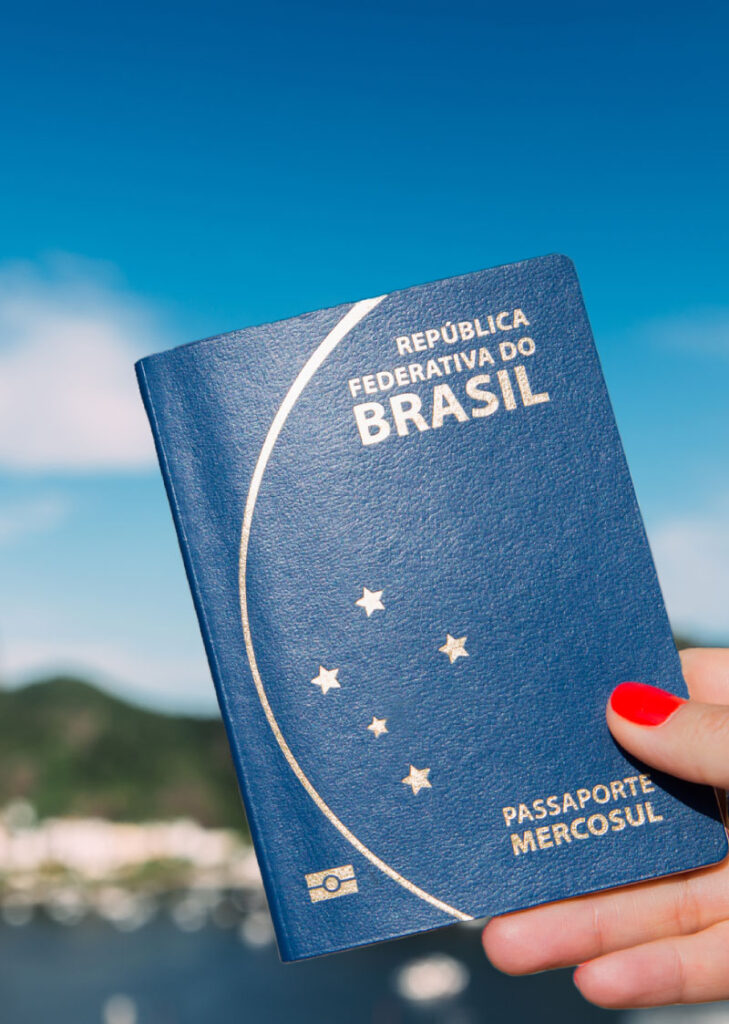Brazilian culture and customs: colorful in the heart of South America
Brazil is a country with a rich and diverse culture rooted in its complex history. A blend of Portuguese, African, and indigenous cultures has shaped a dynamic and vibrant society known for its music, dance, delicious food, and colorful celebrations.
History of the formation of Brazilian culture
Like a beautiful mosaic, Brazilian culture is made up of many different pieces, each with a story to tell. This rich and diverse culture is the result of the complex interaction between the different ethnic groups that have migrated to this land throughout history.
Portuguese Roots: The Founder of Brazilian Culture
- Portuguese colonization: In the 16th century, the Portuguese arrived in Brazil and established the foundations of Brazilian culture. The Portuguese language, Catholicism, and many Portuguese customs and traditions gradually spread among the indigenous and African-descended people.
- Social Structure: The Portuguese established Brazil’s social structure based on a class system, with white Europeans at the top. This social structure would long influence Brazilian social and cultural relations.
The influence of African culture: the rhythm and passion of life
- Slavery: The arrival of millions of African slaves to Brazil is one of the most important events in the country’s history. Africans brought with them their rich culture to Brazil, leaving a profound impact on Brazilian music, dance, cuisine, and religious beliefs.
- Music and dance: The passionate and energetic rhythms of African music became the basis for many Brazilian musics, such as samba, capoeira, and masamba. These musics are now recognized as symbols of Brazilian identity.
Indigenous Culture: Ancient Roots
- Ancient Civilizations: Before the arrival of the Portuguese, there were numerous ancient civilizations in Brazil. These civilizations had a rich and diverse culture that included religious beliefs, art, architecture, and agriculture.
- Resistance and coexistence: Despite the Portuguese’s efforts to destroy indigenous culture, some of their customs and beliefs still survive in some areas of Brazil.
Subsequent migrations: greater diversity
- European Immigration: In the 19th and early 20th centuries, immigration to Brazil from Europe became more widespread. These immigrants came from countries as diverse as Italy, Germany, Spain, and Portugal, and influenced the country’s culture.
- Asian immigration: There was also immigration from Asian countries such as Japan, China, and Lebanon to Brazil, which added to the country’s cultural diversity.
Capital of Brazil
Brasilia is a modern, planned city that was designated as the capital of Brazil in 1960. The city is famous for its unique architecture and modern urban design.

Language of the Brazilian people:
The official language of Brazil is Portuguese. Due to Portuguese colonization of the country, Brazilian Portuguese is used as the main language of communication, education, and media throughout the country.

The importance of family and social relationships in Brazilian culture
Family, the main pillar of Brazilian society
In Brazilian culture, the family holds a very high position and is considered the foundation of society. Family ties in this country are very strong and intimate, and family members usually have close ties to each other. These strong family ties have their roots in the distant past, from the time of Portuguese colonization in Brazil, and have been preserved to this day.

Distinctive features of the importance of family in Brazil:
- Large families: Brazilian families are usually large, with family members from different generations living together.
- Mutual support: Family members support each other and rush to help each other when needed.
- Respect for elders: Family elders are highly respected in Brazil, and important family decisions are often made in consultation with them.
- Family celebrations: Family celebrations in Brazil are very passionate and exciting and are an opportunity for family members to come together.
Extensive social relationships
In addition to strong family ties, Brazilians also have extensive social ties. They are generally friendly, hospitable, and eager to communicate. These qualities have made Brazilian communities very friendly and warm.
Distinctive features of social relations in Brazil:
- Deep friendships: Brazilians usually have close, long-standing friends who stay with them throughout their lives.
- Hospitality: Hospitality is a prominent feature of Brazilian culture, and Brazilians enjoy hosting their guests.
- Strong local communities: Local communities in Brazil are very active and people participate in various social activities.
- Importance of Neighborhood Relations: Neighborhood relations are very important in Brazil, and neighbors usually have close ties.
Why are family and social relationships so important in Brazil?
- Religion and Culture: Catholicism, the dominant religion in Brazil, emphasizes the importance of family and social relationships.
- History: Brazil’s turbulent history, including colonialism and slavery, has led its people to rely on each other and build stronger social ties.
- Climate and Lifestyle in Brazil : Brazil’s warm and pleasant climate and the relaxed and carefree lifestyle of its people have led them to spend most of their time with family and friends.
Celebrations and Ceremonies in Brazilian Culture: Joy and Color in the Heart of South America
Brazil is a country known for its colorful and vibrant celebrations and festivals. These celebrations are rooted in the country’s complex history and diverse culture, and are a blend of Portuguese, African, and indigenous traditions. They are a great attraction not only for Brazilians but also for tourists.

Rio de Janeiro Carnival: The World’s Biggest Celebration
Without a doubt, the most famous celebration in Brazil is the Rio de Janeiro Carnival. This magnificent celebration attracts millions of people from all over the world every year. Samba dancing, colorful costumes, live music and the happy spirit of the people are the hallmarks of this carnival. The Rio de Janeiro Carnival is a symbol of Brazilian culture and the joy of life.
Brazilian religious festivals
- Easter: Easter in Brazil is associated with religious ceremonies and family celebrations.
- Christmas: Christmas is also celebrated with great pomp in Brazil, and Christmas trees and gift-giving are among the common customs of this celebration.
- Local celebrations: Many cities in Brazil have their own local religious celebrations, often mixed with indigenous traditions.
Brazilian local and cultural celebrations
- Music Festivals: Brazil hosts numerous music festivals that feature a variety of music, including samba, bossa nova, and folk music.
- Food festivals: In some regions of Brazil, festivals are held to celebrate local foods.
- Agricultural celebrations: Brazilian farmers also hold harvest celebrations.
Capoeira: Martial Art and Dance
Capoeira is a combination of martial arts, dance, and music with African roots and is very popular in Brazil. Capoeira performances are often held as part of a celebration and are considered a symbol of Brazilian culture.
Reasons why celebrations are important in Brazilian culture
- National Identity: Celebrations help Brazilians maintain their national identity and take pride in their cultural roots.
- Bringing people together: Celebrations are an opportunity for people to come together and strengthen social ties.
- Joy and happiness: Celebrations help people enjoy life and forget about everyday stresses.
- Tourism: Brazilian celebrations generate significant income for the country and help develop the tourism industry.
Foods in Culture in Brazil
Food in Brazilian Culture: A Taste of Heaven
Food in Brazilian culture is not just a physiological need, but an integral part of the country’s cultural, social, and historical identity. Brazil’s climatic and ethnic diversity has led to the emergence of a wide range of cuisines, each with a story to tell.

Distinctive features of Brazilian cuisine
- Variety and Color: Brazilian cuisine is very diverse and uses a mix of local, African, Portuguese, and indigenous ingredients.
- Strong flavors: Brazilian cuisine usually has strong, spicy flavors and uses a lot of spices.
- Emphasis on fresh ingredients: Brazilians place great importance on using fresh and local ingredients.
- Simple cooking: Many Brazilian dishes are cooked simply and using traditional methods.
Some famous Brazilian dishes
- Feijoada: This is the national dish of Brazil and is made from black beans, various meats, sausages, and chorizo.
- Moqueca: This delicious seafood dish is made using fish, shrimp, and a variety of vegetables.
- Caipirinha: This national drink of Brazil is made from sugar cane juice, lemon, and ice.
- Acarajé: This popular street food is made from fried black bean paste and is usually served with Kimbo, a type of hot sauce.
Also read: A list of the best foods in Brazil
The role of food in Brazilian culture
- Celebrations and Ceremonies: Food plays a central role in many Brazilian celebrations and ceremonies.
- Socializing: Eating with friends and family is one of the most important ways to connect in Brazil.
- Cultural identity: Brazilian cuisine reflects the country’s cultural identity, and each region of Brazil has its own cuisine.
- Tourism: Brazilian cuisine is one of the country’s tourist attractions.
The influence of different cultures on Brazilian cuisine
- Portuguese Culture: The Portuguese brought many foods and cooking methods to Brazil.
- African culture: African slaves also had a great influence on Brazilian cuisine, and many African ingredients and cooking methods are seen in Brazilian cuisine.
- Indigenous Culture: The indigenous people of Brazil also diversified Brazilian cuisine, adding many local fruits, vegetables, and spices to these dishes.
Religion and Spirituality Culture in Brazil
Religion and spirituality in Brazil, like other aspects of the country’s culture, is a complex mix of different traditions. This mix is the result of centuries of interaction between indigenous beliefs, Christianity (especially Catholicism), and African influences brought to the country during the era of slavery.

Christianity: The dominant religion
- Roman Catholicism: Catholic Christianity has been the dominant religion in Brazil, especially during the Portuguese colonial period. The majority of the Brazilian population still identifies as Catholic.
- Religious celebrations: Catholic religious celebrations such as Easter and Christmas are celebrated with particular pomp in Brazil and are often mixed with local traditions.
African religions
- Candomblé and Umbanda: These African religions, rooted in indigenous African beliefs, were brought to Brazil by African slaves and are very popular in some regions, especially in the southeast of the country.
- Syncretism: These African religions have blended with Christianity to form unique beliefs. For example, the Orishas (goddesses) in Candomblé have become associated with Catholic saints.
Indigenous beliefs
- Connection with nature: Indigenous Brazilian beliefs emphasize human connection with nature and supernatural forces.
- Shamanism: Shamanism, as an ancient spiritual tradition, is still alive in some areas of Brazil.
- Rain-seeking rituals: In some regions, rain-seeking rituals rooted in indigenous beliefs are held.
Other religions
- Protestantism: In recent decades, Protestantism has grown significantly in Brazil.
- Other religions: Other religions such as Islam, Judaism, and Buddhism also exist in Brazil, but their number of followers is much smaller than that of Christians and followers of African religions.
Spirituality in the daily life of Brazilians
- Belief in supernatural forces: Many Brazilians believe in supernatural forces and the existence of spirits.
- Use of medicinal plants: The use of medicinal plants and traditional healing methods is very common in Brazil.
- Healers and shamans: In some regions of Brazil, healers and shamans play an important role in treating diseases and solving people’s problems.
Brazilian culture in terms of sports: Passion and excitement in the veins of the people
Brazil is a country where sports are not just a pastime, but an integral part of the national identity and culture of the people. The passion and excitement of sports runs in the blood of Brazilians, and this is clearly seen in the high popularity of sports in the country.

Football: The King of Brazilian Sports
- Unparalleled popularity: Football is the most popular sport in Brazil and almost everyone in the country is interested in it.
- Glorious History: The Brazilian national football team is known as one of the most powerful football teams in the world, having won several World Cup titles.
- Influence on culture: Soccer in Brazil is more than just a sport and has influenced the country’s music, dance, language, and even politics.
Other popular sports in Brazil
- Volleyball: After football, volleyball is the second most popular sport in Brazil. The Brazilian national volleyball team has also been very successful at the international level.
- Capoeira: Capoeira is a combination of martial arts, dance, and music that has African roots and is very popular in Brazil.
- Brazilian Jiu-Jitsu: This martial art was invented in Brazil and has many fans around the world.
- Surfing: Surfing is very popular in Brazil, due to the long coastline and decent waves.
The importance of sports in Brazilian culture
- National identity: Sports, especially soccer, are recognized as a symbol of Brazilian national identity.
- Social integration: Sports in Brazil act as a factor in creating social unity and integration.
- Health and fitness: Exercise is also considered a way to maintain health and fitness in Brazil.
- Economic opportunities: Professional sports are a big industry in Brazil and provide employment for many people.
Marriage culture in Brazil
Marriage culture in Brazil, like other aspects of the country’s culture, is a blend of Portuguese traditions, African influences, and the joyful and passionate spirit of the Brazilian people. A marriage in Brazil is not only a legal union, but also a large and passionate celebration for family and friends.
Salient features of marriage in Brazil:
- Importance of Family: Family holds a very high place in Brazilian culture. Therefore, marriage is not only the union of two individuals, but also the union of two families. Families usually play an active role in planning and holding the wedding ceremony.
- Big celebration: Weddings in Brazil are often accompanied by large, long celebrations. Live music, dancing, delicious food, and plenty of drinking are integral parts of these celebrations.
- Traditional clothing: Brides usually wear long, gorgeous white dresses, but in some regions, it is also common to wear colorful dresses. Grooms also usually wear formal suits.
- Religious ceremonies: The majority of Brazilians are Catholic, and many weddings are held in church. However, civil ceremonies are also common.
- Local customs and traditions: Each region of Brazil has its own wedding customs and traditions. Some of these customs may have roots in indigenous or African cultures.
- Gift-giving: Giving gifts to the bride and groom is very traditional in Brazil. Money, household items, and jewelry are among the most common gifts.
- Honeymoon: After the wedding ceremony, couples usually go on a honeymoon. Popular honeymoon destinations in Brazil include beautiful beaches, the Amazon rainforest, and historic cities.
Interesting customs and traditions in Brazilian wedding ceremonies:
- Writing the names of single friends on the wedding dress: This custom is believed to help single friends get married sooner.
- The bride and groom dance with the guests: The bride and groom dance with each of the guests is one of the attractive parts of the wedding ceremony in Brazil.
- Breaking a plate: In some regions, breaking a plate at the feet of the bride and groom is a sign of good luck.
- Sprinkle rice: Sprinkle rice towards the bride and groom after leaving the church or ceremony venue is a sign of blessing and abundance.
The culture of Brazilian life
Brazil is a country with a rich and diverse culture rooted in its complex and intertwined history. A blend of Portuguese, African, and indigenous cultures has shaped a dynamic and vibrant society known for its music, dance, delicious food, and colorful celebrations.
A final word about Brazilian culture and customs
Brazil is a country with a rich and diverse culture, known for its music, dance, delicious food, and colorful celebrations. Getting to know the culture and customs of Brazilians will help you make your trip to this country more enjoyable and connect better with the locals.






